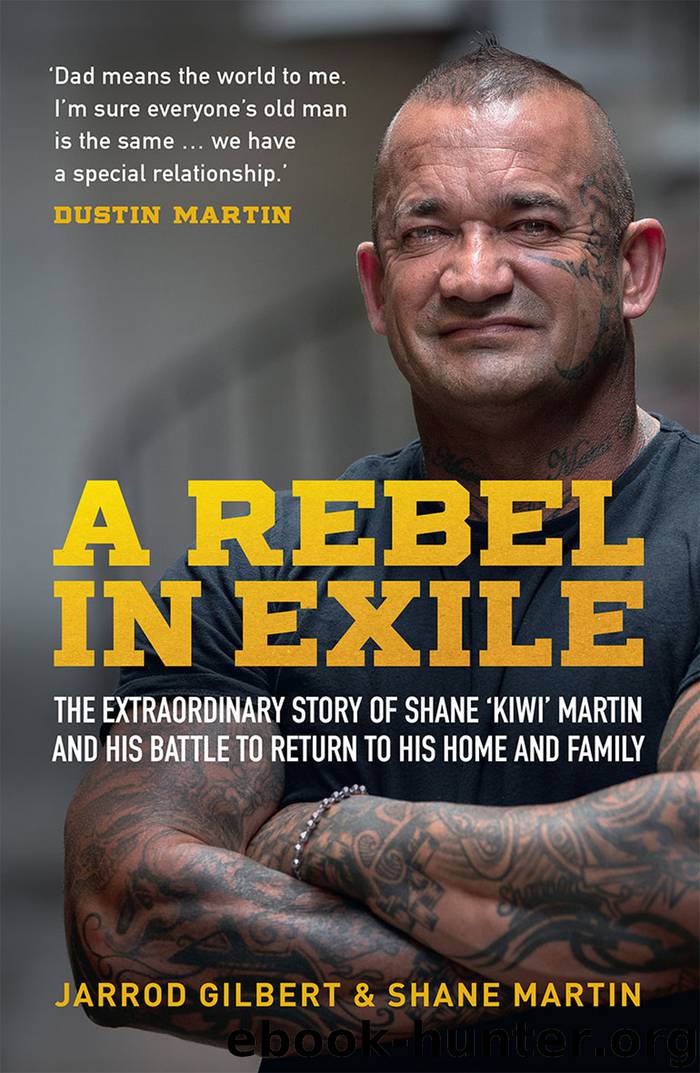A Rebel in Exile by Jarrod Gilebert

Author:Jarrod Gilebert
Language: eng
Format: epub
Tags: ebook
Publisher: Hardie Grant Publishing
Published: 2019-03-04T16:00:00+00:00
Introduction to
CHAPTER 5
In important ways, Kiwi’s story is related to police and government efforts to control the outlaw clubs, which have become, in effect, an effort to wipe them out.
The Milperra massacre may have been the beginning. It’s hard to say for sure but it’s as good a place as any to start. On 2 September 1984, members of the Bandidos and Comancheros sought a decisive end to an increasingly vicious dispute. The showdown at a British motorcycle swap meet was the culmination of ongoing ill will between the two groups, and the car park outside the Viking Tavern in Sydney erupted as more than fifty patched men clashed head-on. The battle was not over quickly, nor was it centralised and pockets of fierce fighting broke out in different places. Knives, baseball bats, chains. Guns filled the air with noise, smoke and bullets. When both sides called time, seven people were dead, including a fourteen-year-old bystander. The bikies had left an indelible scar on Australian history. Laws around firearms changed in the aftermath of Milperra, but over the years the legislative thrust targeting the bikies also increased, most notably in South Australia, New South Wales and Queensland.
When Ross Kemp asked me to go to Australia in 2014 to investigate whether or not there was a documentary to be made on the clubs in Australia, I headed for Queensland, where a set of radical new anti-bikie laws had only recently been introduced, largely targeted around concerns of organised crime.
The laws were remarkable. Not only did they forbid members of certain clubs to work in certain industries – such as tattooing – but if club members even went to their clubhouse or met in groups of three or more they would be arrested on the spot. Bail was forbidden, and those caught would serve a mandatory term of six months in prison. If a member wore any regalia denoting membership in a pub the same regime applied. To be a named club you didn’t have to have committed any crimes – the government just decided it, and there were no rights to appeal.
Furthermore, if a club member committed certain crimes, and there were armfuls of them, he would automatically get an additional fifteen years in prison on top of the punishment for that crime. If he was an office holder in the club, such as a president or sergeant-at-arms, it was an additional twenty-five years in prison.
If, for example, a person committed a relatively minor crime and was sentenced to two years in prison, if he was a club member he would instead serve either seventeen or twenty-seven years, which is more than most murderers get. Swap the term ‘motorcycle club member’ for any other group or association in society and the theoretical underpinnings of this legislation become sinister.
These new laws certainly had their critics, not least of whom was Tony Fitzgerald QC, who headed the Fitzgerald inquiry into political corruption around Queensland premier Joh Bjelke-Petersen in the late 1980s. About the
Download
This site does not store any files on its server. We only index and link to content provided by other sites. Please contact the content providers to delete copyright contents if any and email us, we'll remove relevant links or contents immediately.
| African-American & Black | Australian |
| Chinese | Hispanic & Latino |
| Irish | Japanese |
| Jewish | Native American & Aboriginal |
| Scandinavian |
Becoming by Michelle Obama(10026)
Beartown by Fredrik Backman(5754)
The Last Black Unicorn by Tiffany Haddish(5635)
Man's Search for Meaning by Viktor Frankl(4606)
The Book of Joy by Dalai Lama(3986)
The Five People You Meet in Heaven by Mitch Albom(3569)
In a Sunburned Country by Bill Bryson(3542)
The Choice by Edith Eva Eger(3469)
Full Circle by Michael Palin(3450)
The Mamba Mentality by Kobe Bryant(3279)
The Social Psychology of Inequality by Unknown(3031)
Imagine Me by Tahereh Mafi(2959)
Book of Life by Deborah Harkness(2939)
The Checklist Manifesto by Atul Gawande(2854)
Less by Andrew Sean Greer(2694)
A Burst of Light by Audre Lorde(2607)
The Big Twitch by Sean Dooley(2437)
No Room for Small Dreams by Shimon Peres(2368)
Everest the Cruel Way by Joe Tasker(2342)
